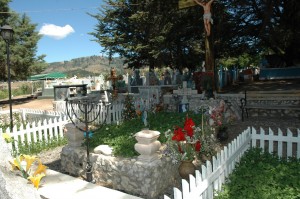
Coming from a society where families have become so fractured that even the father/mother/1.5 kids nucleus is hard to find, I have been impressed by both the extended family life in Chile, and the strong tradition of honoring loved ones who have passed.
In the U.S., cemeteries are usually a one-time visit. As a mortality-denial society, we often stay long enough to view our loved one being laid to rest, and then never return until the next family funeral. We prefer to remember our deceased loved ones from afar. For us, cemeteries are backdrops for terror flicks, not family gatherings.
In Chile, however, cemeteries are a place where families will gather on the deceased’s birthday, death day, wedding anniversary day, saint’s (namesake) day, All Soul’s Day, Memorial Day, or really any day really in which they want to lay flowers, clean the gravesite, talk amongst themselves, talk with the deceased, and to honor life.
Cemeteries are part of Chilean life, not just death, and bear signs of loving attendance. It is rare to see a grave unkempt. This may be indicative of the respect that children are taught to pay to their elders. While there is a large, young population in Chile, life does not end at thirty, nor are elderly shuffled into nursing homes or other facilities to be forgotten.
Last year, we had attended the funeral of a family friend who had passed from lung cancer. He was well respected in the small community of Hualqui, where he had lived, and the honors paid were very endearing. Following a mass at the church on the square, there was a procession to the cemetery, where another brief ceremony was held. Thereafter, instead of a quick exit, many quietly dispersed to visit their own family sites, to remove dead flowers and lay fresh.
Raised gravesites, reminiscent of those in Louisiana, are very common in Chile, although some newer cemeteries are featuring ground level markers. The photo above shows the grave of Padre Ricardo Sammon O’Brien (Father Richard James Sammon, maternal surname O’Brien), who had been much loved by his parish in Portezuela.
The son of Irish immigrants who originally had settled in Harlem, New York, Padre Ricardo was ordained in the Order of Maryknoll in 1956. This Order, which had a long history of missionary work in Africa and Asia, elected to focus their attentions on South America during the year of his ordination. So, after eight months of intensive Spanish language training in Bolivia, Padre Ricardo was assigned to Chile. For 51 years, he devoted his attentions to the ministry, education and improvement of life within the small, wine-growing pueblo of Portezuelo and surrounding area. He built numerous schools, created avenues of access for university education, established Radio Raices, and supported preservation of traditions, music and culture in general. His life exemplified the best of religious service and devotion.
Although it has been several years since his passing, he is still remembered. Fresh flowers graced his grave the day that native Portezuelo son, Adolay gave us a tour of his beloved hometown.
Last week, to mark the birthday of my own father, who had passed more than a decade ago, we laid flowers on the grave of my father-in-law, whose own birthday would have been this week. We shed a few tears, hugged tightly, and then wished the two “old men” a Happy Birthday and to have an Irish whiskey together in Heaven. Then, we made a quick exit.
Did you know Sister Miriam who worked with Father Richard?